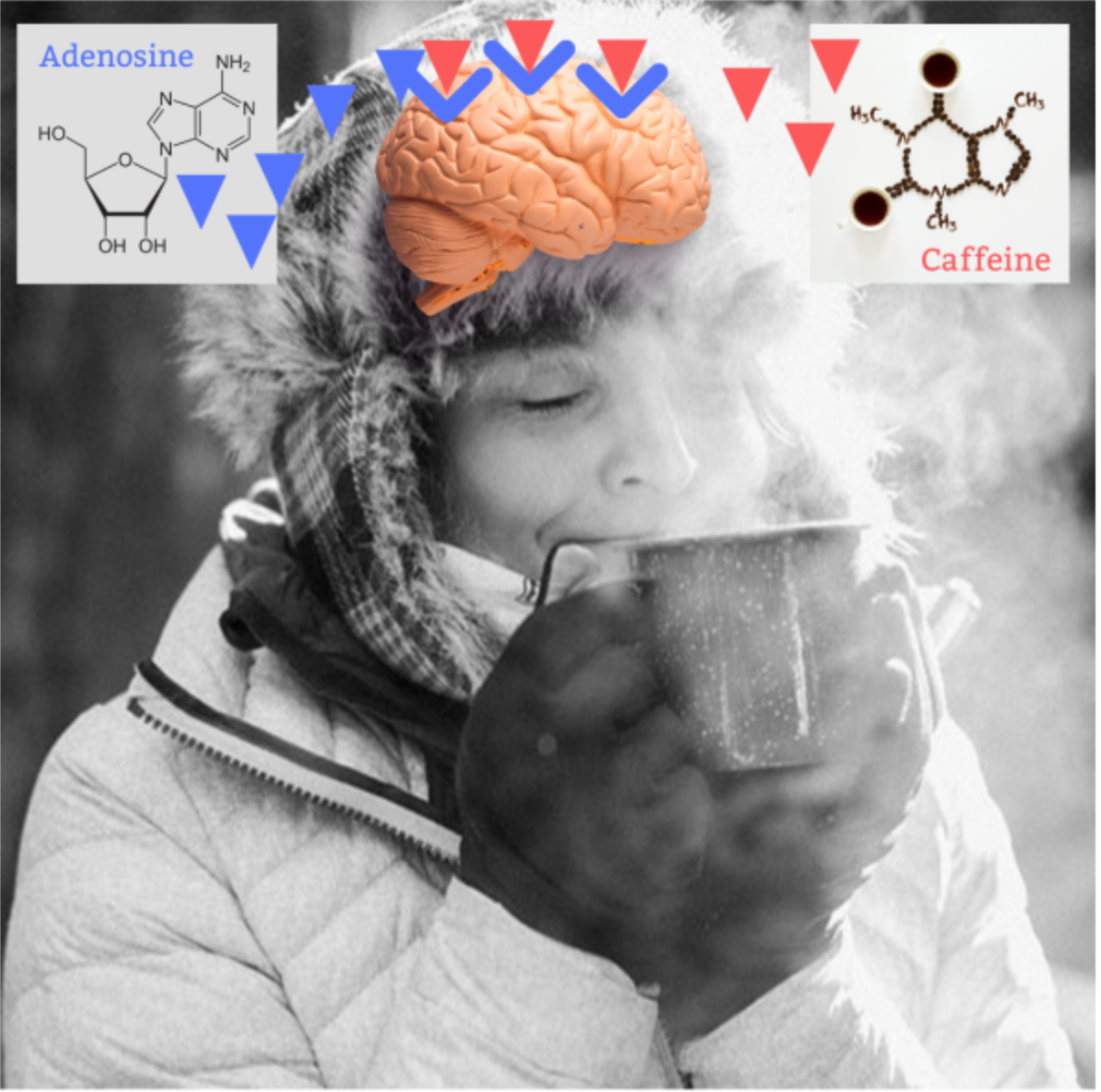Naps & Caffeine: the Good, the Interesting & the Sleepy
I believe the two most exciting concepts in chemistry are the way caffeine works and the way soap works. I’ll tell you about soap another time. Today, we are exploring the functionality of caffeine! I never thought I would be so excited about chemistry, but here we are…
Before we can talk about caffeine, we have to talk about adenosine.
Adenosine
Adenosine is a neurotransmitter, meaning it is a chemical signal that passes between nerves and delivers messages to adenosine-shaped receptors. Adenosine happens to be an inhibitory neurotransmitter and its role in the brain is to block wakefulness signals, which increases our drive for sleep.
The longer we are awake, the more adenosine accumulates in the brain. The more adenosine accumulates in the brain, the sleepier we are. When we sleep, the adenosine clears out leaving us feeling refreshed when we wake up (assuming we are getting enough sleep).
Caffeine molecules are similar enough in shape to adenosine molecules that they are able to fit the same receptors. When caffeine binds to these receptors, there is no space for adenosine to deliver its inhibitory message. Caffeine blocks the sleepiness signals, which is why it makes us feel more alert! In addition to blocking the adenosine receptors, caffeine also triggers the release of epinephrine (aka adrenaline) and increases activity of dopamine receptors (dopamine makes us feel good and focus better). As caffeine is metabolized in the liver, it has even further stimulant effects, including increased athletic ability, increased flow of oxygen to the brain, and increased epinephrine in the blood. However, while caffeine is occupying those adenosine receptors, adenosine is still being produced and accumulating in the brain, which is why we feel even sleepier when the caffeine wears off.
Over time, with consistent caffeine ingestion, the brain adapts to the artificial stimulation by producing more adenosine receptors. It also reduces the number of receptors for one of our natural stimulants, norepinephrine. This combination results in us needing more caffeine to fill in those adenosine receptors to continue blocking the sleepiness and achieve desired alertness levels. The withdrawal-like symptoms many feel when they suddenly stop ingesting caffeine are related to this increase in adenosine receptors suddenly experiencing the influx of adenosine that has been lurking and waiting to pounce. After about 7-12 days of letting your brain recalibrate without any caffeine, the numbers of receptors will balance themselves back out.
Cool, huh!?
So how do naps fit in?
Naps can serve as a sort of ‘pressure-release valve’ for adenosine build up. Even a short power nap can clear out just enough adenosine to restore alertness, at least until it is time for a big sleep. So if you are someone who gets sleepy during the day and you have the time, naps can be a great choice! Sleep expert, Dr. Matthew Walker, recommends keeping naps short, around 20 minutes, so that you do not enter into the deep sleep phase, unless you have time for a full 90 minute sleep cycle. Any length in between or longer is likely to have you waking up groggy. Dr. Walker also says if you are someone who has trouble sleeping at night, naps are not recommended- you want to build up as much adenosine as possible to fall asleep and stay asleep at night!
Whether you choose a power nap or an extra cup of coffee to get you through your sleepy times, I wish you the best!
Disclaimer: this is my understanding and interpretation of information shared by people much smarter than me. I am merely a curious health nut seeking to understand and share my nerdy excitement. This is not to be taken as medical napping advice.
Sources:
https://chem.ku.edu/sites/chem.ku.edu/files/docs/CHEM190/caffeine.pdf
https://www.verywellhealth.com/adenosine-and-sleep-3015337
https://www.ncbi.nlm.nih.gov/pmc/articles/PMC3958836/
Huberman, Dr. Andrew. “Huberman Lab Podcast. ” https://hubermanlab.com. Episode # 31 with Dr. Matthew Walker. Published August 2, 2021.
Oxford dictionary - Definition of Neurotransmitter
Originally posted August 13, 2021


